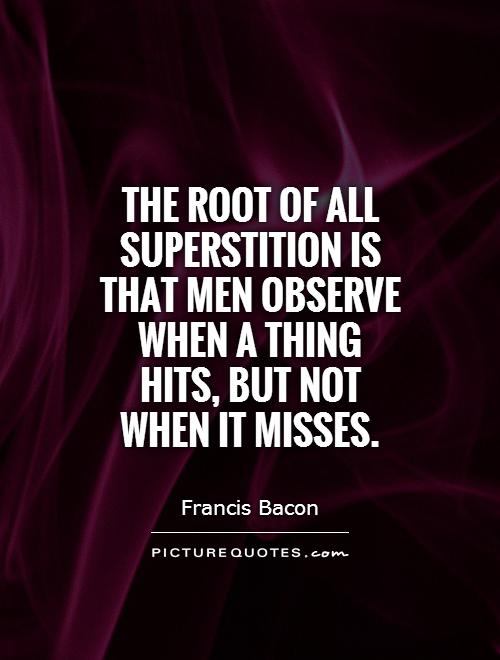The root of all superstition is that men observe when a thing hits, but not when it misses

The root of all superstition is that men observe when a thing hits, but not when it misses
Francis Bacon, a renowned English philosopher, statesman, and scientist, once famously said, “The root of all superstition is that men observe when a thing hits, but not when it misses.” This profound statement sheds light on the human tendency to focus on instances where something aligns with our beliefs or expectations, while disregarding or overlooking instances where it does not.Superstition, by definition, is a belief or practice resulting from ignorance, fear of the unknown, or a false conception of causation. It is a common human trait to seek patterns and connections in the world around us, even when they may not exist. When something happens to confirm our superstitions, we tend to take notice and attribute it to some supernatural force or higher power. However, when things do not go as expected or when our superstitions fail to materialize, we often dismiss these instances as mere coincidences or anomalies.
This selective observation of events can lead to a reinforcement of superstitions and irrational beliefs. For example, if someone believes that wearing a certain item of clothing brings them good luck and they happen to have a successful day while wearing it, they are likely to attribute their success to the clothing. On the other hand, if they have a bad day while wearing the same item, they may simply brush it off as a fluke or not give it much thought.
In a broader sense, Bacon’s words can be applied to various aspects of human behavior and decision-making. We tend to remember instances that confirm our biases or beliefs, while conveniently forgetting or ignoring those that contradict them. This cognitive bias, known as confirmation bias, can lead to flawed reasoning, poor judgment, and the perpetuation of false beliefs.












 Friendship Quotes
Friendship Quotes Love Quotes
Love Quotes Life Quotes
Life Quotes Funny Quotes
Funny Quotes Motivational Quotes
Motivational Quotes Inspirational Quotes
Inspirational Quotes